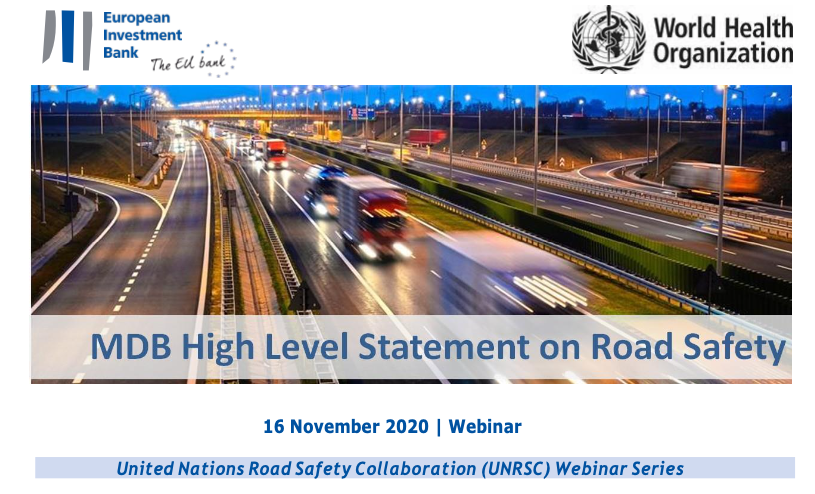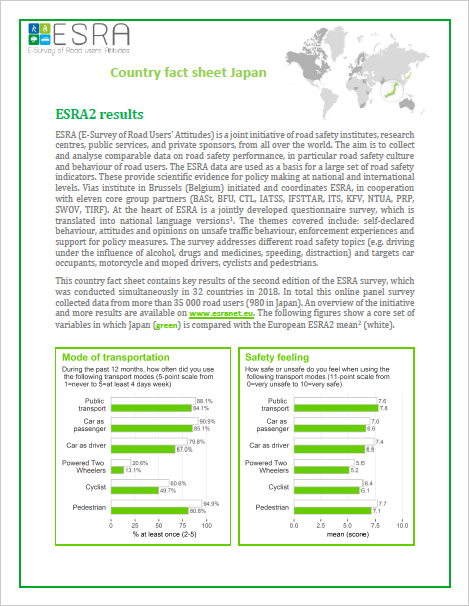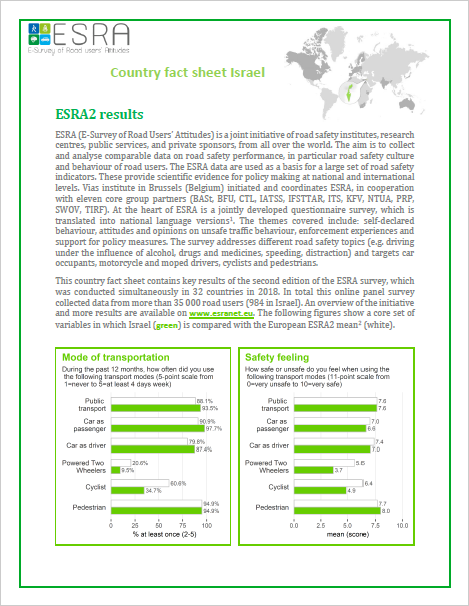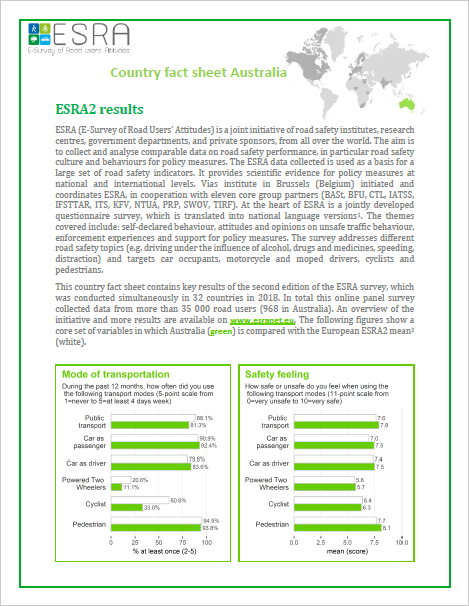Multilateral Development Banks release Joint High Level Statement on Road Safety

Ten MDBs made a joint statement of commitment to to support the second decade of action on road safety on 16 November 2020.
Each signatory institution commits to appointing a high-level road safety champion and promoting a more ambitious, integrated, accountable and results-oriented approach in countries, with particular focus on safe infrastructure for all users.
Contact Person
Global Meeting of Regional Road Safety Observatories
This virtual global meeting is being organized by the regional road safety observatories in Africa (ARSO), Asia-Pacific (APRSO) and Ibero-America (OISEVI), with the support of international development organizations, including the World Bank, the African Development Bank (AfDB), the Asian Development Bank (ADB), the World Health Organization (WHO), the International Transport Forum (ITF) and the Fédération Internationale de l' Automobile (FIA) who have been collaborating on the development of these observatories to improve availability and quality of road safety data since in 2018.
Contact Person
Webinar: Improving the Trade in Used Vehicles: Presentation of the New UNEP Global Report
The United Nations Environment Programme (UNEP) is organizing a webinar on 5 November from 4 p.m. to 5 p.m (EAT) to share findings on the trade in used vehicle and the global regulatory environment, following a successful launch of its new report Used Vehicles and the Environment - A Global Overview of Used Light Duty Vehicles: Flow, Scale and Regulation.
The webinar is open to all who wish to join and participate in a dynamic discussion which will be preceded by a panel session. Experts will share their perspective on the used vehicles market and the need for its regulation.
Contact Person
Role of Road Safety Audits in Improving Traffic Safety - Online Workshop
Qatar Transportation and Traffic Safety Center (College of Engineering, Qatar University) in collaboration with the National Traffic Safety Committee of the State of Qatar, International Road Federation (IRF), World Conference on Transport Research Society (WCTRS), and Khatib & Alami Company are organizing a technical webinar entitled "Role of Road Safety Audits in Improving Traffic Safety". This technical webinar will be given by group of Internationally well-known experts from the International Road Federation (IRF) and the United Nations for Project Services (UNOPS).
Contact Person
E-Survey of Road Users’ Attitudes (ESRA) - Republic of Korea Country Fact Sheet

ESRA (E-Survey of Road Users’ Attitudes) is a joint initiative of road safety institutes, research centres, government departments, and private sponsors, from all over the world. The aim is to collect and analyse comparable data on road safety performance, in particular road safety culture and behaviours for policy measures.
The ESRA data collected is used as a basis for a large set of road safety indicators. It provides scientific evidence for policy measures at national and international levels. Vias institute in Brussels (Belgium) initiated and coordinates ESRA, in cooperation with eleven core group partners. At the heart of ESRA is a jointly developed questionnaire survey, which is translated into national language versions. The themes covered include: self-declared behaviour, attitudes and opinions on unsafe traffic behaviour, enforcement experiences and support for policy measures. The survey addresses different road safety topics (e.g. driving under the influence of alcohol, drugs and medicines, speeding, distraction) and targets car occupants, motorcycle and moped drivers, cyclists and pedestrians.
This country fact sheet contains key results of the second edition of the ESRA survey, which was conducted simultaneously in 32 countries in 2018. In total this online panel survey collected data from more than 35,000 road users 1043 in the Republic of Korea).
E-Survey of Road Users’ Attitudes (ESRA) - Japan Country Fact Sheet

ESRA (E-Survey of Road Users’ Attitudes) is a joint initiative of road safety institutes, research centres, government departments, and private sponsors, from all over the world. The aim is to collect and analyse comparable data on road safety performance, in particular road safety culture and behaviours for policy measures.
The ESRA data collected is used as a basis for a large set of road safety indicators. It provides scientific evidence for policy measures at national and international levels. Vias institute in Brussels (Belgium) initiated and coordinates ESRA, in cooperation with eleven core group partners. At the heart of ESRA is a jointly developed questionnaire survey, which is translated into national language versions. The themes covered include: self-declared behaviour, attitudes and opinions on unsafe traffic behaviour, enforcement experiences and support for policy measures. The survey addresses different road safety topics (e.g. driving under the influence of alcohol, drugs and medicines, speeding, distraction) and targets car occupants, motorcycle and moped drivers, cyclists and pedestrians.
This country fact sheet contains key results of the second edition of the ESRA survey, which was conducted simultaneously in 32 countries in 2018. In total this online panel survey collected data from more than 35,000 road users 980 in Japan).
E-Survey of Road Users’ Attitudes (ESRA) - Israel Country Fact Sheet

ESRA (E-Survey of Road Users’ Attitudes) is a joint initiative of road safety institutes, research centres, government departments, and private sponsors, from all over the world. The aim is to collect and analyse comparable data on road safety performance, in particular road safety culture and behaviours for policy measures.
The ESRA data collected is used as a basis for a large set of road safety indicators. It provides scientific evidence for policy measures at national and international levels. Vias institute in Brussels (Belgium) initiated and coordinates ESRA, in cooperation with eleven core group partners. At the heart of ESRA is a jointly developed questionnaire survey, which is translated into national language versions. The themes covered include: self-declared behaviour, attitudes and opinions on unsafe traffic behaviour, enforcement experiences and support for policy measures. The survey addresses different road safety topics (e.g. driving under the influence of alcohol, drugs and medicines, speeding, distraction) and targets car occupants, motorcycle and moped drivers, cyclists and pedestrians.
This country fact sheet contains key results of the second edition of the ESRA survey, which was conducted simultaneously in 32 countries in 2018. In total this online panel survey collected data from more than 35,000 road users (984 in Israel).
E-Survey of Road Users’ Attitudes (ESRA) - India Country Fact Sheet

ESRA (E-Survey of Road Users’ Attitudes) is a joint initiative of road safety institutes, research centres, government departments, and private sponsors, from all over the world. The aim is to collect and analyse comparable data on road safety performance, in particular road safety culture and behaviours for policy measures.
The ESRA data collected is used as a basis for a large set of road safety indicators. It provides scientific evidence for policy measures at national and international levels. Vias institute in Brussels (Belgium) initiated and coordinates ESRA, in cooperation with eleven core group partners. At the heart of ESRA is a jointly developed questionnaire survey, which is translated into national language versions. The themes covered include: self-declared behaviour, attitudes and opinions on unsafe traffic behaviour, enforcement experiences and support for policy measures. The survey addresses different road safety topics (e.g. driving under the influence of alcohol, drugs and medicines, speeding, distraction) and targets car occupants, motorcycle and moped drivers, cyclists and pedestrians.
This country fact sheet contains key results of the second edition of the ESRA survey, which was conducted simultaneously in 32 countries in 2018. In total this online panel survey collected data from more than 35 000 road users (1035 in India).
E-Survey of Road Users’ Attitudes (ESRA) - Australia Country Fact Sheet

ESRA (E-Survey of Road Users’ Attitudes) is a joint initiative of road safety institutes, research centres, government departments, and private sponsors, from all over the world. The aim is to collect and analyse comparable data on road safety performance, in particular road safety culture and behaviours for policy measures.
The ESRA data collected is used as a basis for a large set of road safety indicators. It provides scientific evidence for policy measures at national and international levels. Vias institute in Brussels (Belgium) initiated and coordinates ESRA, in cooperation with eleven core group partners. At the heart of ESRA is a jointly developed questionnaire survey, which is translated into national language versions. The themes covered include: self-declared behaviour, attitudes and opinions on unsafe traffic behaviour, enforcement experiences and support for policy measures. The survey addresses different road safety topics (e.g. driving under the influence of alcohol, drugs and medicines, speeding, distraction) and targets car occupants, motorcycle and moped drivers, cyclists and pedestrians.
This country fact sheet contains key results of the second edition of the ESRA survey, which was conducted simultaneously in 32 countries in 2018. In total this online panel survey collected data from more than 35 000 road users (968 in Australia).
Road Safety Calculator Strategic Design Support Tool Outreach Webinar
The World Bank Global Road Safety Facility, Iowa State University and Monash University would like your thoughts on a new tool that is being designed to support road safety strategy selection in low- and middle-income countries. Please participate in one of our webinars to help us understand your road safety analysis needs.
There are webinars scheduled across 12 global time zones for viewing convenience. Please see the linked flyer for full details on registration.
Contact Person
Pagination
- Previous page
- Page 4
- Next page